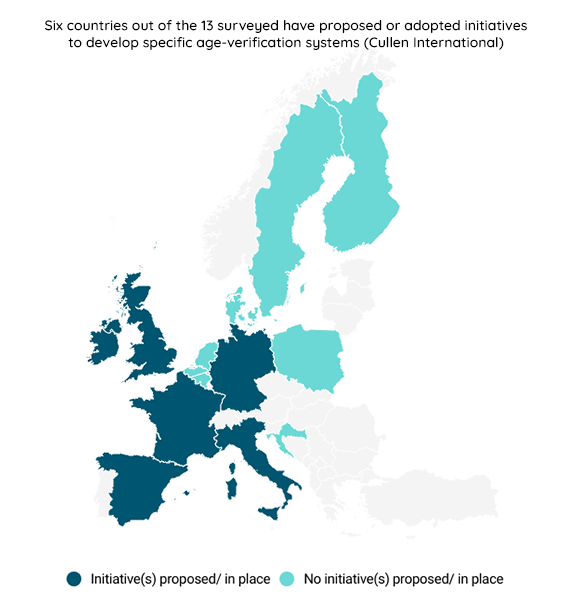Cullen International has just published a new benchmark which analyses if in thirteen selected countries there are initiatives to specify age-verification systems to control or restrict minors' exposure to harmful content (such as pornographic content and gratuitous violence) on internet platforms.
If initiatives exist (beyond the mere transposition of the EU level rules), it shows:
- their aim and scope of application;
- if a specific type of technology is mandated or foreseen (photo identification matching, credit card checks, facial estimation…);
- if the system is applicable to service providers established in other member states;
- a description of the main aspects/ rules.
Background
The Audiovisual Media Services (AVMS) Directive requires audiovisual media services and video-sharing platforms (VSPs) to take appropriate measures to protect minors from content that can impair their physical, mental or moral development. For VSPs, measures should consist of, as appropriate, setting up and operating age verification systems or (easy to use) systems to rate content. It is up to the relevant regulatory authorities to assess whether measures are appropriate considering the size of the video-sharing platform service and the nature of the service that is provided.
The Digital Services Act (DSA) requires platforms that are accessible to minors to take measures to ensure children's safety, security and privacy. It also requires very large online platforms (VLOPs) and very large online search engines (VLOSEs) to assess the impact of their services on children’s rights and safety, and take mitigating measures if needed, which may include age verification.
Initiatives in six countries
The benchmark shows that France, Germany, Ireland, Italy, Spain and the UK have initiatives (in place or proposed).

For more information and access to the benchmark, please click on “Access the full content” - or on “Request Access”, in case you are not subscribed to our European Media service.
more news
19 December 25
CSRD transposition: Belgium, Denmark, Finland and Slovenia transpose the “stop-the-clock” directive
Cullen International’s updated benchmark tracks the progress made by the 27 EU member states in transposing the CSRD and the related “stop-the-clock” directive.
19 December 25
Global trends in AI regulation
Our latest Global Trends benchmark compares policies and regulations on artificial intelligence (AI) across 14 jurisdictions around the world.
19 December 25
Implementation of European Media Freedom Act: general overview in 12 EU member states
Our new Media benchmark shows if there are initiatives/rules in the selected countries which aim to put into application the EU Media Freedom Act (EMFA). If yes, it describes the scope of the main measures proposed. The benchmark also provides information on the next legislative or regulatory steps.